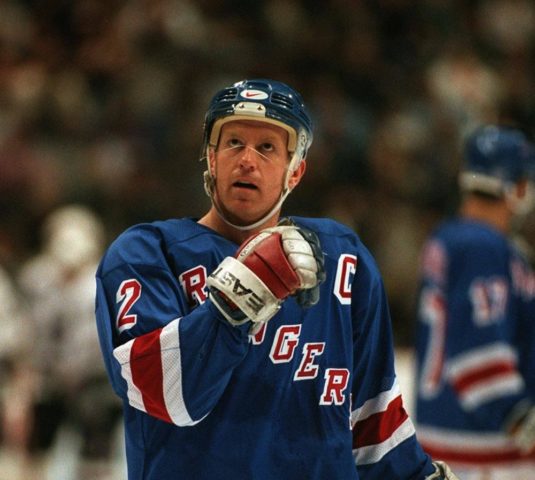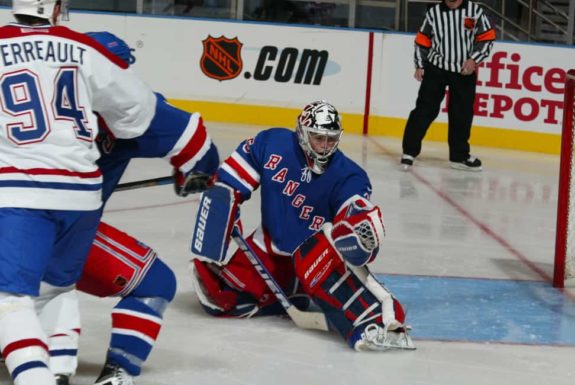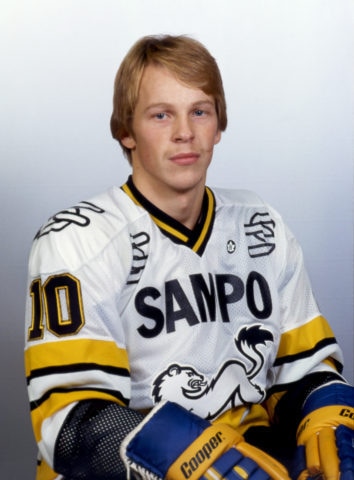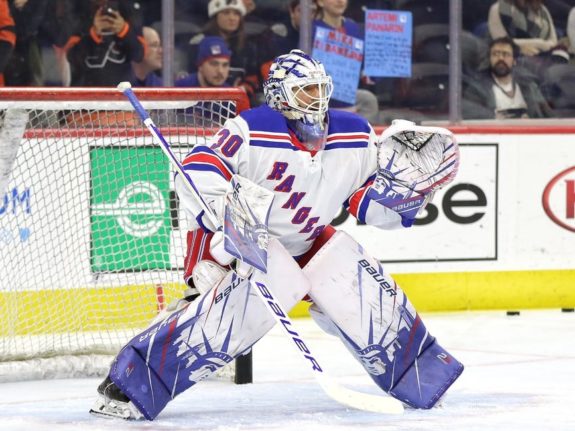The New York Rangers may not have the greatest overall success when it comes to gaining stars from the NHL Entry Draft, especially when it comes to early draft picks. However, there have been diamonds and hidden gems that the team has selected since the draft’s inception in 1963.
Some may feel the Rangers’ draft success is more than meets the eye, given playoff runs or popularities of players like Chris Kreider and Jesper Fast. Others feel the Rangers can’t tout draft success with just one championship since the draft’s inception, let alone since their 1939-40 title.
Maybe free agency and trades have been able to offset any times the Rangers came up short in the draft, but the draft is the opportunity to get dibs on young talent in hopes of building a future’s foundation. And that is the very same mission the Rangers have had since their Stanley Cup window closed and the team announced a full rebuild in February 2018.
So with the draft’s importance in mind, let’s look at the Rangers’ best picks from each round of the seven-round, current draft format.
Round 1: Brian Leetch, D
The Rangers have two first-round selections that have gone on to become Hall of Famers, and several who have had at least above-average careers. But out of all the names in this class, arguably none have done more for the team and are more beloved by the Rangers faithful than defenseman Brian Leetch.

Known as one of the greatest defensemen in the league’s history, Leetch was drafted ninth overall by the Rangers in the 1986 NHL Draft. Leetch spent 1986-87 at Boston College and was a member of the 1988 U.S. Olympic team, not making his NHL debut until after the Olympics were done.
But in 1988-89, his first full season with the Rangers, he made an immediate impact. Just as he did prior to the NHL, he showed not only could he grab the puck from the opposition, he made the most of his possessions and put up points for his team. He scored 71 points, including a rookie-defenseman record 23 goals, en route to winning the Calder Memorial Trophy.
Leetch continued to be a major contributor, and in the 1991-92 season, he put up 102 points, becoming the fifth, and most recent, defenseman in NHL history to break the 100-point mark in a season. After injuries plagued his 1992-93 campaign, he came back to score 79 points (56 assists, both third on the team) in the 1993-94 season, and he scored 34 points in the playoffs en route to helping the Rangers break their curse and win a Stanley Cup. He earned the Conn Smythe Trophy for his efforts, becoming the first non-Canadian to do so.
Leetch continued to be a favorite and was even team captain during the time Messier spent with the Vancouver Canucks. Leetch ended up getting dealt to the Toronto Maple Leafs in the 2003-04 season but did not play much longer before his official retirement announcement in May 2007. He was inducted into the U.S. Hockey Hall of Fame in 2008 — with his number retired by the Rangers that year — and the Hockey Hall of Fame in 2009.
Round 2: Mike Richter, G
Before there was “The King,” there was Mike Richter. He may not have been the biggest goalie physically, but he played with heart, speed, smarts and discipline.

Richter was drafted 28th overall in 1985, though he played two seasons at the University of Wisconsin-Madison and in several international tournaments (including the 1988 Olympics) before making his official NHL debut during the 1988-89 playoffs. He was originally the backup goalie, but his time came after John Vanbiesbrouck was traded following the 1992-93 season.
That first season as the main goalie, Richter had a career-best 42 wins, five shutouts and 2.57 goals against average, plus a .910 save percentage. Richter then went on to become the eighth goaltender in NHL history with four shutouts in one postseason, as he too, was a leader in the Rangers’ 1993-94 championship campaign.
Richter was consistently one of the greatest goaltenders and went on to become the first in Rangers history to achieve 300 wins, and he was at one point the team’s all-time leader in wins. Unfortunately, he was very injury-prone and was forced into retirement in 2003 after suffering a skull fracture and two concussions.
Richter’s number was retired in February 2004 and he was inducted into the U.S. Hall of Fame in 2008.
Round 3: Mike McEwen, D
If there’s a round that can be considered unlucky for the Rangers’ draft history, this is unfortunately it. Players selected in this round either faded or had better success outside of the Rangers. Mike McEwen, at the very least, made the most of his time in New York.
McEwen was actually selected in two drafts in 1976 — going 42nd overall to the Rangers in the NHL Draft and 71st overall to the Toronto Toros in the WHA Draft. McEwen signed with the Rangers and scored 43 points in 80 games that first season. McEwen had 58 points in 1978-79, one of six Rangers to have at least 20 goals and 50 points that season, and had 13 points (11 assists) during the team’s playoff run that ultimately ended in a Stanley Cup Final loss.
McEwen was traded to the Colorado Avalanche early the next season. He’d play for six other teams, including four New York Islanders seasons that resulted in three of four victories in the Stanley Cup Finals. His NHL career ended in 1988, and McEwen retired from professional hockey in 1992.
Round 4: Tony Amonte, RW
After putting up over 50 points consistently for Thayer Academy (where he is currently the head coach) and Boston University, Tony Amonte was selected No. 68 overall in the 1988 draft.
After debuting with appearances during two games of the 1990-91 playoffs, Amonte’s first season with the Rangers saw him put up 69 points (35 goals and 34 assists) in 79 games played and nine points in 13 playoff games, earning a place on the NHL All-Rookie Team and finishing third in Calder Memorial Trophy voting.

Amonte scored 114 points over the next two seasons in New York, 49 of them from goals. Amonte was traded to the Chicago Blackhawks not long before the start of the 1993-94 playoffs, where the Rangers won the Cup. Fortunately for Amonte, he went on to still achieve great success in Chicago, scoring over 60 points per season (minus time split between the Blackhawks and HC Fassa in 1994-95) and becoming a five-time All-Star.
After a brief stint with the then-Phoenix Coyotes, Amonte spent time with the Philadelphia Flyers and Calgary Flames, last playing in 2006-07. As of the end of 2018-19, Amonte ranks 13th all-time in most NHL points scored by an American with 900.
Amonte was also an international veteran, representing the U.S. in multiple tournaments and winning a gold medal at the 1996 World Cup of Hockey and a silver at the 2002 Olympics.
Round 5: Sergei Zubov, D
Drafted by the Blueshirts with the 85th overall pick of the 1990 NHL Draft, Sergei Zubov spent five seasons with CSKA Moscow before making his NHL debut during the 1992-93 season. He’d score 31 points with 23 assists in 49 games played, setting an early tone for his career as a defenseman who was able to set up his teammates for scoring success.
The next season would be Zubov’s greatest, as he led the team in scoring with 89 points and 77 assists, helping to lead the team to the Presidents’ Trophy. He followed that up with a playoff performance that saw 19 points in 22 games en route to helping New York win the Stanley Cup.
Zubov was traded to the Pittsburgh Penguins prior to the 1995-96 season and was dealt the next offseason to the Dallas Stars, where he remained for the rest of his NHL career. He put up at least 30 assists and 40 points each season from the start of his tenure in Dallas through 2006-07.
After injuries ate up most of his final two NHL seasons, Zubov played one season with SKA Saint Petersburg before retirement.
Round 6: Reijo Ruotsalainen, D
Though not as hollow as their third-round pick history, the sixth round also hasn’t treated the Rangers well, though this round brought them a talent like Reijo Ruotsalainen. Ruotsalainen, who was drafted No. 119 overall in 1980, debuted with the team in the 1981-82 season.

Ruotsalainen used his speed, which won him praise from coaches and fans, to make up for his 5-foot-8, 165-pound frame. He put up 56 points in 78 games played that first season and placed third on the team in assists with 56. Ruotsalainen was so talented in skating and offensive contributions that in the 1984-85 season, then-head coach Herb Brooks, as explained by Robin Finn in a 1986 New York Times article, “moved him into a forward position to take advantage of his speed and accurate shot.” That season, Ruotsalainen led the team with 73 points.
Ruotsalainen returned to Europe for the start of the 1986-87 season, and he spent most of his career there. His remaining NHL time came with the Edmonton Oilers in 1986-87 and with the New Jersey Devils and Oilers in 1989-90. Fortunately for him, the two Oilers team he played on would win the Stanley Cup, the first coming on a team that featured the likes of Messier and Wayne Gretzky.
Round 7: Henrik Lundqvist, G
There are several stories in sports of a player drafted late going on to great success — the NFL’s Tom Brady and Antonio Brown, and the NBA’s Manu Ginobili, for example. For the Rangers, this can be applied to the man who’s been the face of the franchise for over a decade now.

Henrik Lundqvist was drafted No. 205 overall in the 2000 draft, but he played with Frolunda HC until joining the Rangers for the 2005-06 season. At that time, Lundqvist was thrown into the starting goaltender slot thanks to an injury to Kevin Weekes. He and the Rangers never looked back, as he quickly began to leave his mark on the team and league, gaining many accomplishments and records.
Lundqvist quickly recorded his first shutout and broke the franchise record for wins by a rookie goaltender that season with 30. The 2012 Vezina Trophy recipient achieved 30 wins 10 times in his next 11 seasons, an NHL record. During 2018-19, Lundqvist became the sole goaltender in league history with at least 20 wins in 13 consecutive seasons. At 449 wins, Lundqvist is the all-time Rangers leader in the category, and he is currently five away from tying Curtis Joseph for fifth in all-time NHL wins.
Since his debut, Lundqvist has wowed audiences with his aggressiveness and athleticism in the butterfly style, as well as having the concentration and speed to make even the most miraculous of saves, earning the nickname of “King Henrik.”
Perhaps the biggest misfortune for his tenure is that despite making three Eastern Conference Finals and a Stanley Cup Final appearance, Lundqvist’s Rangers were never able to win him a title. And since the start of the rebuild, there have been many questions about if Lundqvist should even remain a part of the team.
Maybe Lundqvist never gets to taste the feeling of holding Lord Stanley’s Cup, but a Rangers jersey retirement and a call to the Hall of Fame are certainly in his future.
Not every Rangers draft pick can be a success, but these seven athletes make up the ultimate historical team draft.